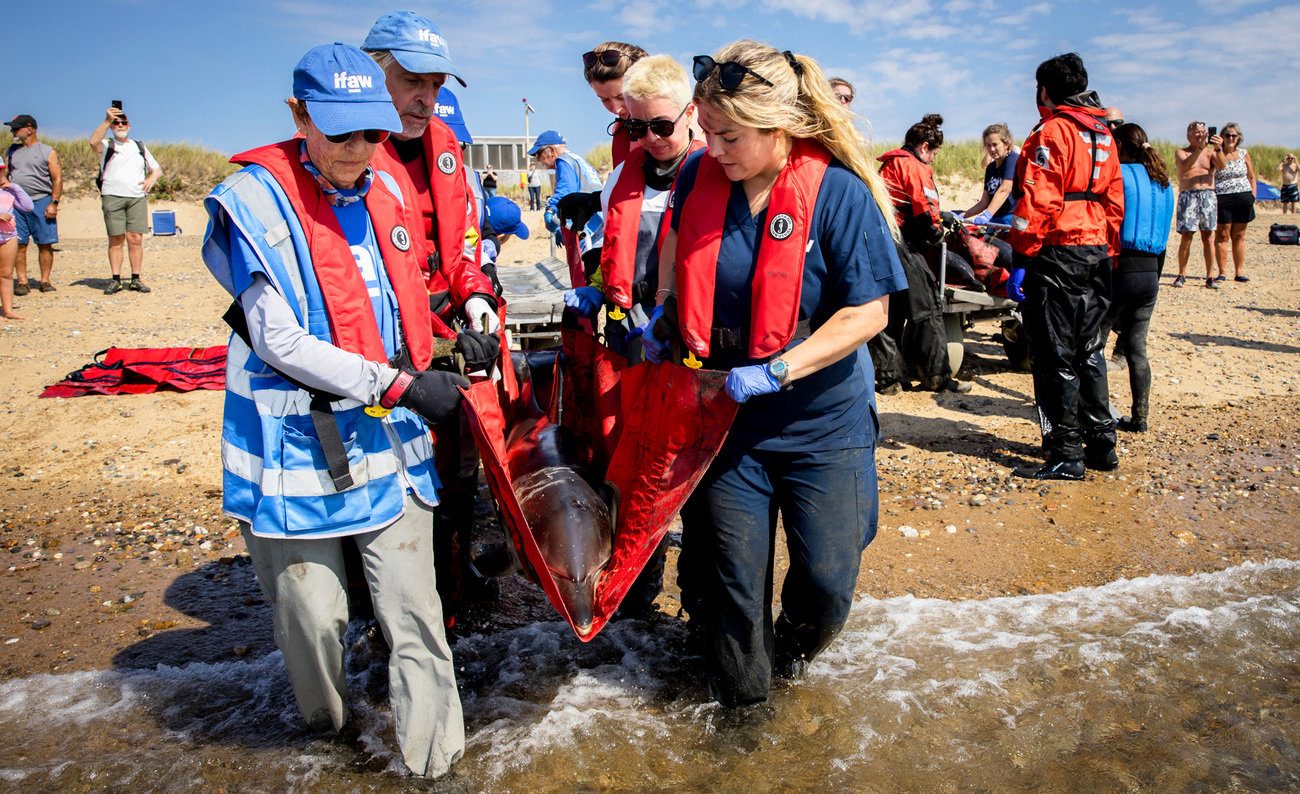Stranded Marine Mammal Rescue - Global
When the tide is low, the stakes are high for marine mammalsRescuers save 11 dolphins in two-day Cape Cod stranding event
Rescuers save 11 dolphins in two-day Cape Cod stranding event

(Yarmouth Port, MA – September 14, 2025)—Over the weekend, a coordinated marine mammal rescue effort in Wellfleet, Massachusetts, led to the successful rescue and release of multiple dolphins following a series of strandings.
IFAW received the first report to its Stranding Hotline before 8 AM on Saturday, warning that several dolphins were swimming in Chipman’s Cove, Wellfleet—a known stranding hotspot due to Wellfleet’s shallow bays, complex tidal flats, and hook-like geography. IFAW volunteers soon sighted 12 dolphins in the area.
With low tide still ahead at 10:30 AM, IFAW’s experts mobilized quickly.
“These strandings happen fast, and every minute counts,” said Nicole Hunter, rescue manager at IFAW. “Our teams worked through rising heat, shifting tides, and difficult terrain to reach and support these dolphins. We know each animal is an individual life, and every rescue is an act of hope.”
At the time of low tide, multiple animals began stranding at several locations in Wellfleet. In total, seven of the twelve dolphins stranded, with some still swimming in water.
By midday, those seven animals were extracted into IFAW’s custom-built mobile dolphin rescue unit, the remaining five continuing to swim in Wellfleet Harbor. The transported dolphins received veterinary treatments, including IV fluids and supportive care, to keep them as cool and comfortable as possible as they reached the release site off Herring Cove Beach in Provincetown.
Volunteers remained on alert overnight. Early Sunday morning, five dolphins were re-sighted in the Herring River Gut in Wellfleet. One died prior to the team’s arrival, and the four live animals were transported and released into deeper water, also off Herring Cove Beach.
All released dolphins swam off well, with a satellite tag affixed to one animal each day for continued monitoring.
All 12 dolphins involved in the two-day response were common dolphins (Delphinus delphis), a species frequently encountered in Cape Cod waters. The group included six males and six females, ranging from juveniles to subadult and adult individuals.
IFAW has responded to a total of 100 dolphin and porpoise stranding events so far this year across Cape Cod and southeastern, MA. Even with decades of experience, situations like this demand rapid mobilization of staff, volunteers, veterinarians, and specialized response equipment. This weekend’s events included collaboration with the Cape Cod National Park Service.
“To see dolphins stranded is always heartbreaking,” continued Hunter. “What sustains us—the rescue teams, the volunteers, the veterinarians—is seeing those same animals swim away. It reminds us why we do this work.”
To report a live or stranded marine mammal, text or call IFAW’s Stranding Hotline at (508) 743‑9548.
ENDS
Photo editors: High resolution images available at https://spaces.hightail.com/space/hrVxOJLYNt (©IFAW)
- All response efforts conducted under a federal stranding agreement between IFAW and NMFS under the MMPA
- On CAPE COD, or along the southern coast to RI, call or text IFAW’s Stranding Hotline at (508) 743-9548
- For Plymouth, MA to Marshfield, MA: Whale and Dolphin Conservation at (617) 688-6872
- Scituate, MA to Rockport, MA and Martha’s Vineyard: NOAA at (866) 755-6622.
- NEW HAMPSHIRE to Essex, MA: Seacoast Science Center Marine Mammals Strandings at (603) 997-9448,
- MAINE: Marine Mammals of Maine (800) 532-9551
- NANTUCKET: Marine Mammal Alliance Nantucket (833) 667-6626
Press contact:
Stacey Hedman
Senior Communications Director, IFAW
m: +1 508 737 2558
e: shedman@ifaw.org
Related content
Every problem has a solution, every solution needs support.
The problems we face are urgent, complicated, and resistant to change. Real solutions demand creativity, hard work, and involvement from people like you.